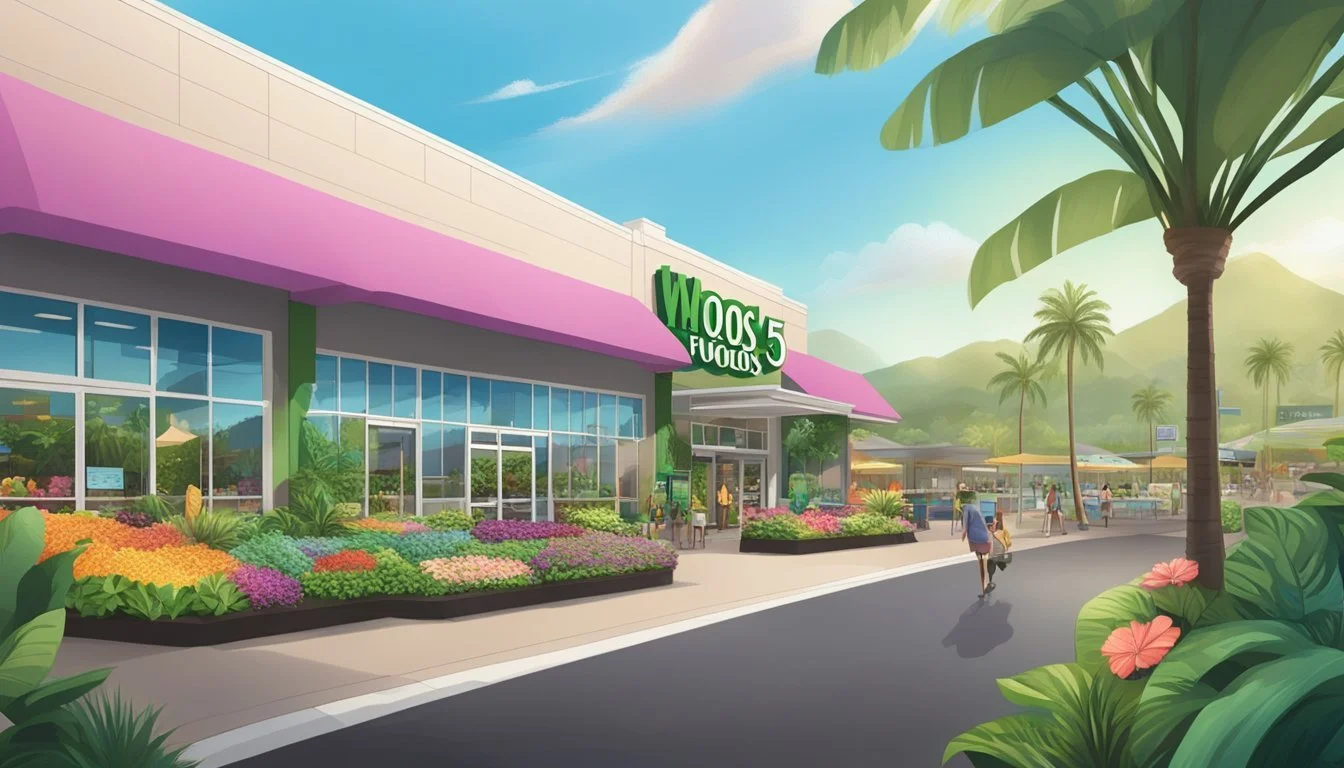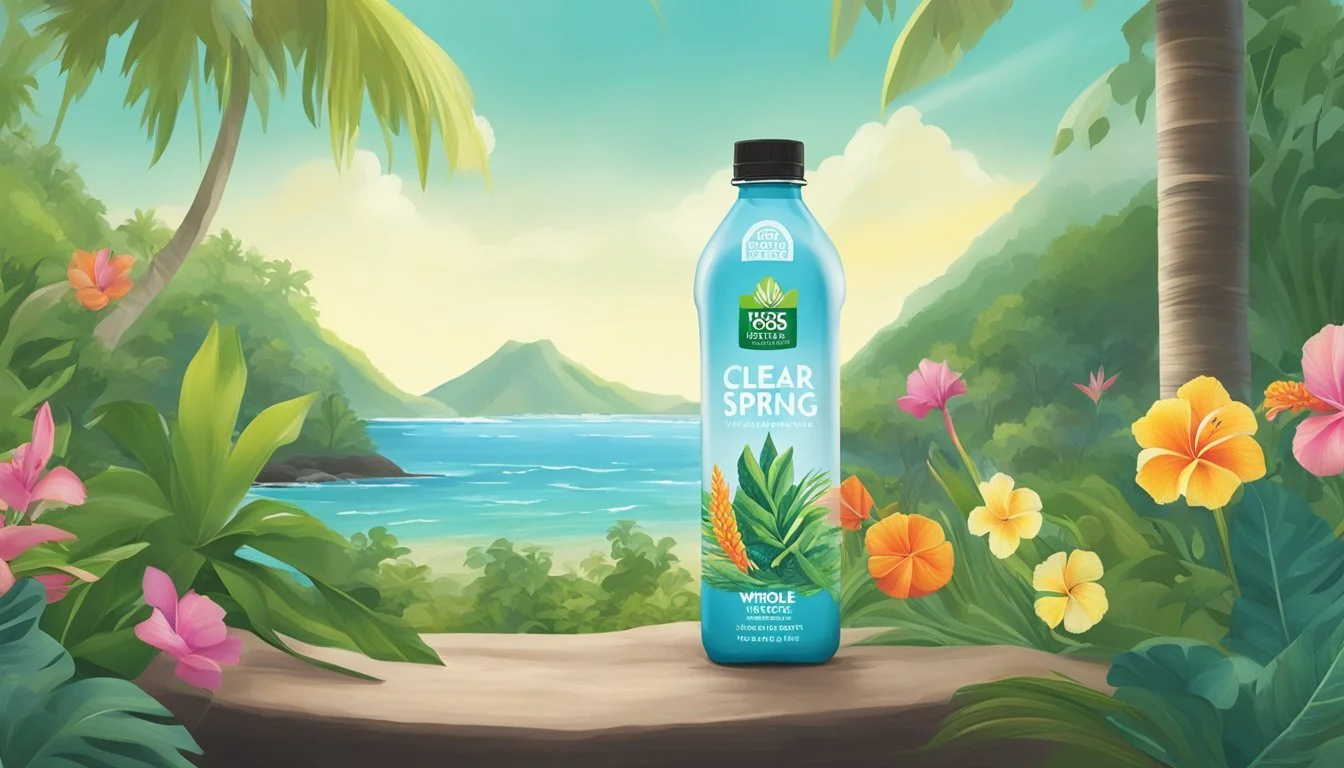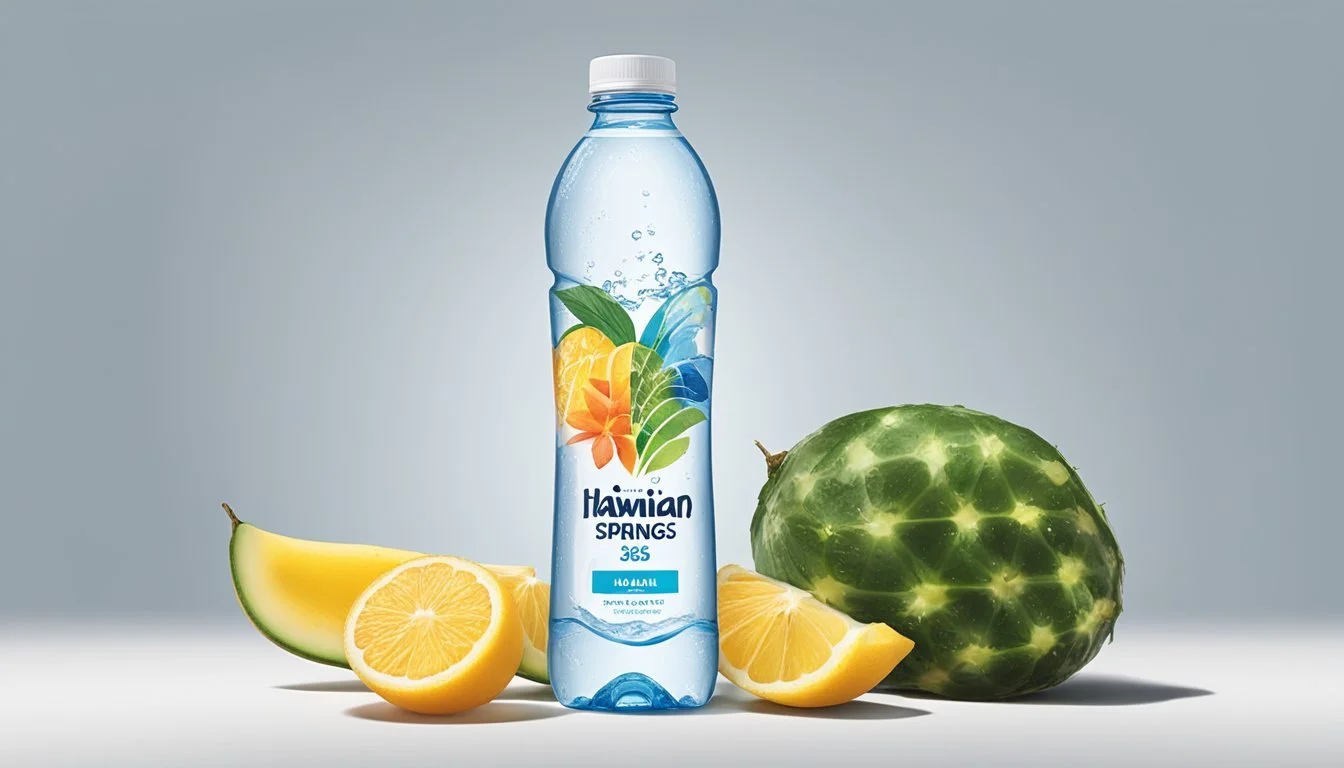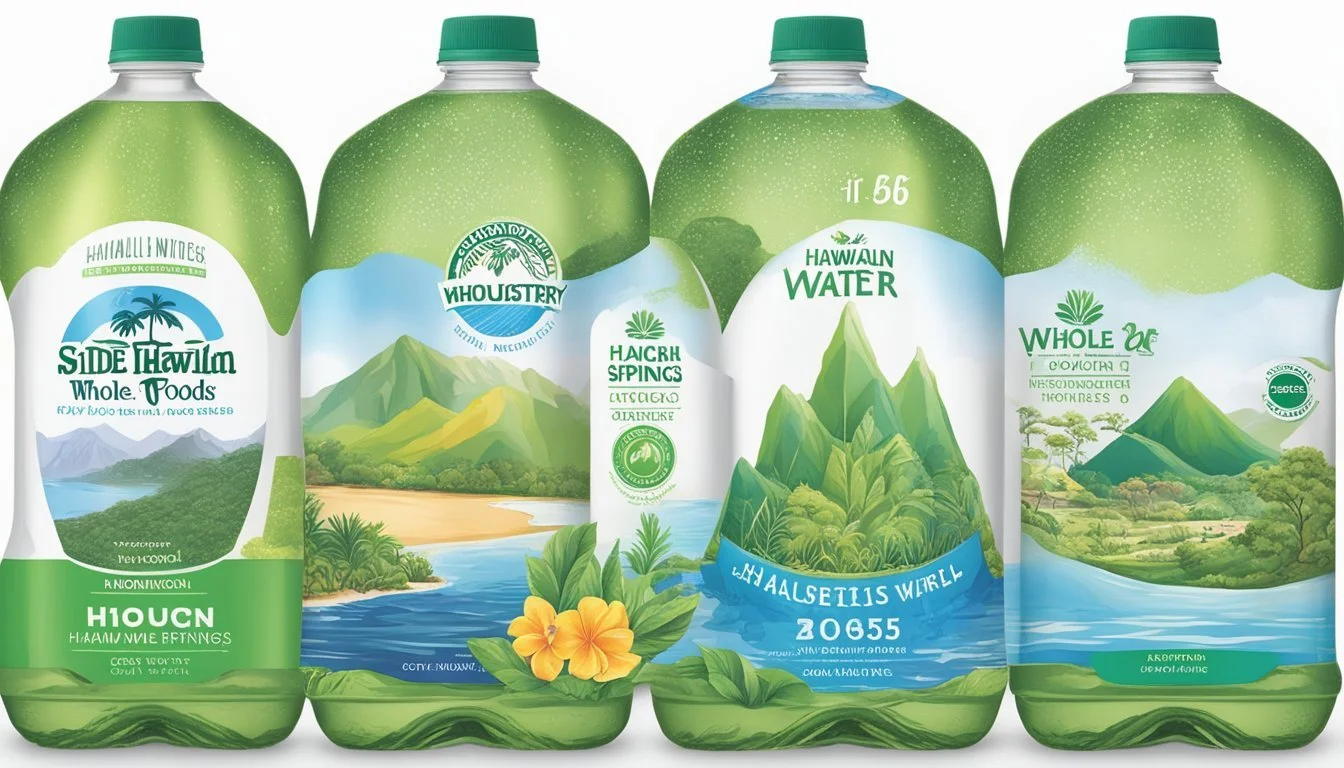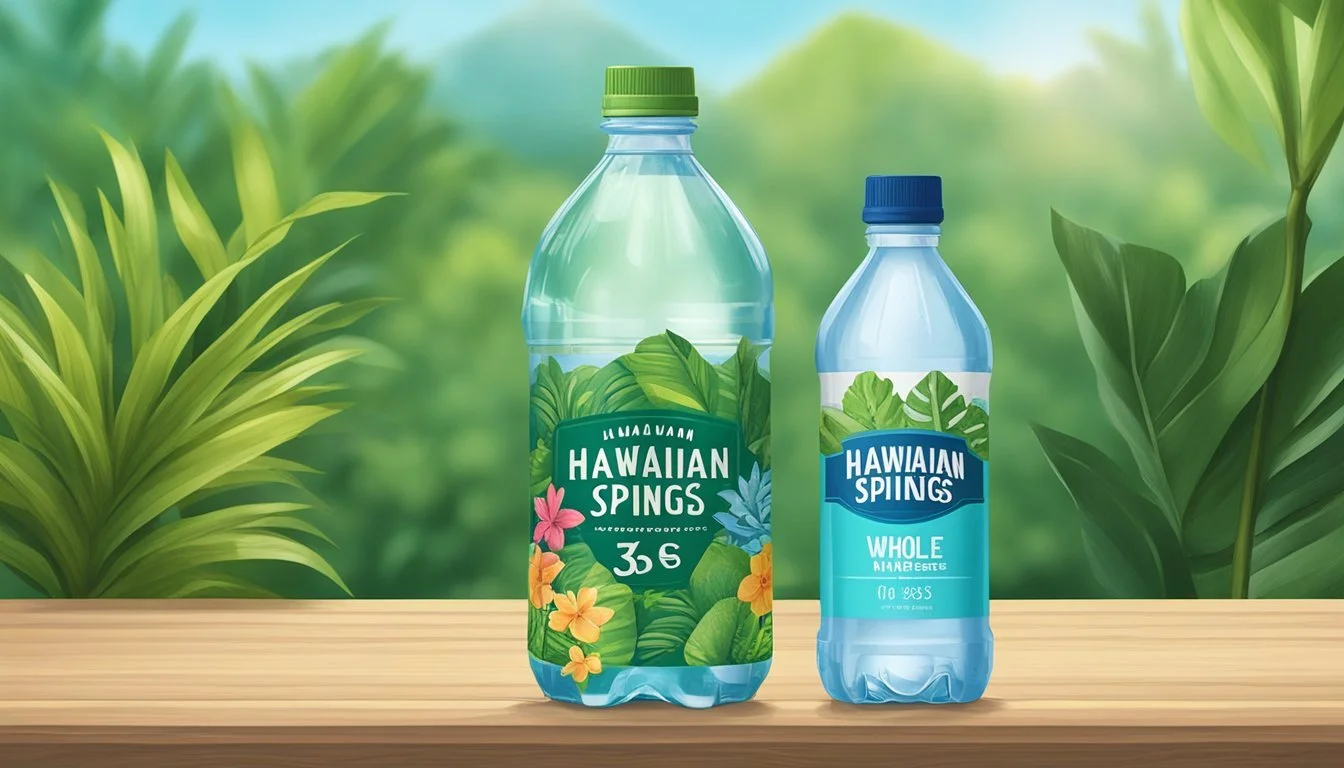Hawaiian Springs vs. Whole Foods 365
A Comparative Bottled Water Review
When it comes to choosing the right bottled water, the decision often boils down to taste, source, and cost. Hawaiian Springs and Whole Foods 365 are two popular choices, each with distinct characteristics. Hawaiian Springs, sourced from an ancient artesian aquifer in Hawaii, boasts a naturally alkaline pH and a clean, crisp taste.
Whole Foods 365 offers a range of bottled water options, including spring water, that are praised for their affordability and accessibility. For those concerned with price, Whole Foods 365 tends to be more budget-friendly, although some critics note a somewhat sour aftertaste in their spring water.
Each brand has its unique advantages: Hawaiian Springs is valued for its origin and superior taste, while Whole Foods 365 provides economical options that are easy to find. This comparison will help readers decide which bottled water best suits their preferences and needs.
Understanding Bottled Water
Bottled water is available in various forms, each with distinct characteristics and sources. Two prominent types are spring water and purified water.
Spring water comes from natural springs, where water flows to the surface from underground. These waters often contain natural minerals that can affect taste and nutritional content.
Purified water undergoes filtration processes such as reverse osmosis or deionization to remove impurities and contaminants. While this can enhance purity, it may also strip away minerals.
Popular brands, such as Hawaiian Springs and Whole Foods 365, offer different types of bottled water. Hawaiian Springs is known for its premium spring water sourced from a volcanic aquifer in Hawaii. Whole Foods 365 provides a variety of options including spring water, purified water, and more specialized varieties like alkaline and electrolyte water.
The mineral content in bottled water can vary significantly. Spring water often retains natural minerals like calcium and magnesium. Purified water, in contrast, tends to have lower mineral content because of filtration processes.
Filtration methods such as reverse osmosis are crucial in determining the final quality of bottled water. Reverse osmosis forces water through a semipermeable membrane, removing a broad range of contaminants. This process is commonly used in producing purified water.
When choosing between spring water and purified water, considerations may include taste preference, mineral content, and source quality. Understanding these aspects can help consumers make more informed choices regarding their bottled water options.
Brand Profiles
This section focuses on key aspects of both Hawaiian Springs and Whole Foods 365 bottled water, such as their water sources, company values, and specific product details.
Hawaiian Springs
Hawaiian Springs sources its water from a natural spring located on the Big Island of Hawaii. The water is naturally filtered through volcanic rock, which contributes to its purity and unique taste.
Hawaiian Springs emphasizes sustainability and environmental responsibility. They use eco-friendly bottling practices and aim to minimize their carbon footprint.
The company markets its water as pure, unaltered, and naturally alkaline, with a pH level around 7.7 to 8.2.
Their commitment to quality and environmental stewardship is a strong selling point for environmentally conscious consumers.
Whole Foods 365
Whole Foods 365 offers a variety of bottled water products, including spring water, alkaline water, and electrolyte-enhanced water. The water is sourced from various springs depending on the product, ensuring a consistent supply.
The brand is known for its affordability and accessibility, as it's available in Whole Foods stores nationwide.
Whole Foods 365 also places a strong emphasis on quality and transparency. Their spring water is marketed as being naturally sourced and free from additives.
The company employs sustainable practices, including eco-friendly packaging and a focus on reducing plastic waste.
Their diverse product range and commitment to sustainability make them a popular choice among health-conscious shoppers.
Health and Hydration
The benefits of staying hydrated are numerous and can affect everything from energy levels to cognitive function. Proper hydration goes hand in hand with the mineral content of the water, which can contribute to overall health.
Importance of Hydration
Hydration is essential for maintaining bodily functions. It helps in regulating body temperature, keeping joints lubricated, and removing waste.
Consuming adequate water is linked to improved energy levels and cognitive function.
Staying hydrated can also aid in digestion. Both Hawaiian Springs and Whole Foods 365 waters can be reliable sources of hydration. Hawaiian Springs is sourced from Hawaiian volcanic rock, which can add unique minerals to the water.
Mineral Content and Health Benefits
Mineral content is a crucial factor for bottled water. Hawaiian Springs water has naturally occurring calcium and magnesium, which are beneficial for bone health and muscle function.
Whole Foods 365 Electrolyte Water includes added electrolytes, which can enhance hydration and athletic performance.
Minerals like calcium and magnesium support various bodily functions, making the choice of water significant. Whole Foods 365 Alkaline Water, with a pH of 9.5+, can balance body acidity. This can be beneficial for those looking to regulate their pH levels.
Taste and Quality Comparison
When deciding between Hawaiian Springs and Whole Foods 365 bottled water, it's essential to consider both the taste and various quality parameters. This analysis will compare the palate profile and water quality parameters of the two brands to help determine which stands out.
Palate Profile
Hawaiian Springs water is often praised for its smooth and refreshing taste. It has a slight sweetness, attributed to the natural filtration through volcanic rock, which adds a distinctive mineral balance without overwhelming the palate. This results in a clean finish that many find appealing.
On the other hand, Whole Foods 365 offers a range of bottled waters, each with its own taste profile. For example, the 365 Everyday Value Spring Water is typically described as crisp and neutral. The 365 Alkaline Water has a higher pH, which some consumers feel gives it a smoother taste, though it might come off as slightly more metallic to others.
Water Quality Parameters
Hawaiian Springs Water:
pH Level: Around 7.7, which is close to neutral, making it suitable for most drinking preferences.
Mineral Balance: Contains a modest amount of minerals like calcium and magnesium, enhancing taste without compromising purity.
Purity: Sourced from deep within the Big Island, undergoing natural filtration through volcanic rock, ensuring a high level of purity.
Whole Foods 365 Water:
Spring Water pH: Approximately 7.5, providing a neutral pH similar to Hawaiian Springs.
Alkaline Water pH: 9.5+, designed to reduce acidity and offer purported health benefits.
Mineral Balance: Varies by type; the Alkaline version is fortified with electrolytes, while the spring water maintains a more natural mineral profile.
Purity: Whole Foods claims rigorous quality control, ensuring their water meets high purity standards, including testing for contaminants like PFAS.
Both Hawaiian Springs and Whole Foods 365 provide options that cater to various taste and quality preferences, making the choice largely dependent on personal preference.
Environmental Considerations
Choosing between Hawaiian Springs and Whole Foods 365 bottled water involves evaluating the environmental impact of each brand. Key factors include the source of the water, sustainability practices, and the environmental footprint of their packaging.
Sourcing and Sustainability
Hawaiian Springs sources its water from a natural spring on the Big Island of Hawaii. Known for its purity, the brand emphasizes minimal environmental disruption during extraction. They engage in sustainable practices to protect the surrounding ecosystems.
Whole Foods 365 spring water also taps into natural sources but has faced scrutiny for its environmental practices. PFAS chemicals were found in their bottled water, raising concerns about long-term sustainability. Whole Foods aims to improve their environmental strategies but hasn’t matched the transparency level of Hawaiian Springs.
Packaging and Recycling
Plastic usage is a significant consideration. Hawaiian Springs uses BPA-free plastic bottles, which are fully recyclable. They have made strides in reducing the plastic content per bottle to lessen environmental impact.
Whole Foods 365 uses recyclable plastic as well but has faced criticisms for not pushing the recycling initiative as aggressively. They are working on plans to incorporate more recycled materials in their packaging.
Both brands aim for environmentally friendly packaging but differ in their execution and effectiveness. Sodium content does not directly affect environmental considerations but can be a factor for consumers concerned with water quality.
Industry Standards and Certifications
When examining bottled water, it's essential to consider industry standards and certifications.
Both Hawaiian Springs and Whole Foods 365 adhere to the standards set by the International Bottled Water Association (IBWA). This organization ensures that bottled water companies follow rigorous guidelines for safety and quality.
Health standards are also crucial. Bottled water must meet the requirements of the FDA and EPA for contaminants and additives. Regular testing ensures that the water remains within the acceptable limits for substances like PFAS, arsenic, and lead.
Safety in bottled water production extends to handling and bottling procedures. Facilities are inspected for cleanliness and proper equipment use. Both brands maintain these high standards to ensure consumer safety.
Label accuracy is another important factor. Labels must clearly list the water source and any treatments applied. Transparent labeling helps consumers make informed choices about what they are consuming.
These standards and certifications ensure that Hawaiian Springs and Whole Foods 365 offer safe, high-quality bottled water that meets or exceeds industry expectations.
Consumer Perspectives
Consumers have strong opinions about both Hawaiian Springs and Whole Foods 365 bottled water, influencing their purchasing decisions through reviews and trends.
Customer Reviews and Feedback
Customer reviews play a crucial role in shaping perceptions of bottled water brands. Hawaiian Springs is often praised for its crisp and refreshing taste, sourced from natural springs in Hawaii. Many customers highlight its purity and soft mineral content. On the other hand, Whole Foods 365 garners mixed reviews.
Some consumers find it to be a cost-effective and decent option, while others criticize its somewhat metallic aftertaste. Negative feedback often points out concerns related to the presence of PFAS chemicals, affecting brand loyalty.
Social media platforms serve as significant venues for customer feedback. Reviews about Hawaiian Springs frequently mention its unique, premium feel. In contrast, Whole Foods 365 reviews are more varied, with a noticeable number of customers mentioning quality inconsistencies.
Market Trends and Preferences
Market trends show that bottled water preferences vary based on factors such as price, brand reputation, and perceived quality. Hawaiian Springs tends to attract consumers looking for premium options and willing to pay a higher price for perceived natural and pure water.
Whole Foods 365, though less premium, appeals to budget-conscious individuals seeking a reliable everyday water option.
Brand loyalty is more pronounced for premium brands like Hawaiian Springs due to its niche market presence and strong regional identity. Most Whole Foods shoppers view 365 as a practical choice rather than a brand towards which they form strong loyalty.
Social media trends also indicate a growing awareness of environmental impacts and chemical content in bottled water, influencing preferences and sparking conversations around safer, eco-friendly options.
Price and Value
Hawaiian Springs bottled water typically has a premium price point, reflecting its source from Hawaiian aquifers.
In contrast, the Whole Foods 365 line offers more affordable options. Here are some price comparisons based on available data:
Whole Foods 365 Alkaline Water (1L): $1.29
Whole Foods 365 Electrolyte Water (500 mL): $0.79
Whole Foods 365 Spring Water (500 mL): $0.69
The Whole Foods 365 options provide a range of choices at relatively lower prices than Hawaiian Springs.
When considering value for money, the focus often includes both price and the perceived quality or benefits of the water. Consumers prioritizing cost may lean toward Whole Foods 365 due to its affordability.
On the other hand, Hawaiian Springs markets itself with a unique origin, which some consumers may find worth the extra expense.
In terms of store pricing, one can find Whole Foods 365 products exclusively at Whole Foods Market locations, while Hawaiian Springs are available at multiple retailers and online outlets.
Considering the variety and price points, Whole Foods 365 is an attractive option for budget-conscious buyers, whereas those seeking a premium beverage experience might prefer Hawaiian Springs.
Conclusion: The Bottom Line
Choosing between Hawaiian Springs and Whole Foods 365 bottled water boils down to personal preference.
Hawaiian Springs boasts its source from the Big Island, claiming high purity and a smooth taste. This appeals to those seeking a premium experience. Its exotic origin adds a unique appeal.
Whole Foods 365 offers a more budget-friendly option, with wide availability. Some reviews mention it has an average taste, with a slightly dry aftertaste.
Feature Hawaiian Springs Whole Foods 365 Source Big Island, Hawaii Various spring sources Taste Smooth, high purity Average, slightly dry Cost Premium pricing Budget-friendly Availability Limited, specialty stores Widely available, accessible
In the end, the best choice depends on individual needs. If exotic origin and premium quality are priorities, Hawaiian Springs stands out. For those who value affordability and easy access, Whole Foods 365 is the final recommendation.
Each brand has its unique strengths, making the decision a matter of personal preference.
More About Hawaiian Springs
Acqua Pana vs Hawaiian Springs: Which Bottled Water is Better?
Aqua Carpatica vs Hawaiian Springs: Which Bottled Water is Better?
Aquafina vs Hawaiian Springs: Which Bottled Water is Better?
Arrowhead vs Hawaiian Springs: Which Bottled Water is Better?
Boxed Water vs Hawaiian Springs: Which Bottled Water is Better?
Castle Rock vs Hawaiian Springs: Which Bottled Water is Better?
Core Hydration vs Hawaiian Springs: Which Bottled Water is Better?
Deer Park vs Hawaiian Springs: Which Bottled Water is Better?
Essentia vs Hawaiian Springs: Which Bottled Water is Better?
Hawaiian Springs vs 1907water: Which Bottled Water is Better?
Hawaiian Springs vs 7-Select: Which Bottled Water is Better?
Hawaiian Springs vs Alkaline88: Which Bottled Water is Better?
Hawaiian Springs vs Antipodes: Which Bottled Water is Better?
Hawaiian Springs vs Big Chill: Which Bottled Water is Better?
Hawaiian Springs vs BodyArmor: Which Bottled Water is Better?
Hawaiian Springs vs Cascade Mountain: Which Bottled Water is Better?
Hawaiian Springs vs CBD Living: Which Bottled Water is Better?
Hawaiian Springs vs Crystal Geyser: Which Bottled Water is Better?
Hawaiian Springs vs Crystal Lake: Which Bottled Water is Better?
Hawaiian Springs vs Essence pH10: Which Bottled Water is Better?
Hawaiian Springs vs Hawaii Volcanic: Which Bottled Water is Better?
Hawaiian Springs vs Kirkland Signature: Which Bottled Water is Better?
Hawaiian Springs vs Liquid Death: Which Bottled Water is Better?
Hawaiian Springs vs Mananalu: Which Bottled Water is Better?
Hawaiian Springs vs Open Water: Which Bottled Water is Better?
Hawaiian Springs vs Proud Source: Which Bottled Water is Better?
Hawaiian Springs vs Pure Life: Which Bottled Water is Better?
Hawaiian Springs vs Purely Sedona: Which Bottled Water is Better?
Hawaiian Springs vs Refreshe: Which Bottled Water is Better?
Hawaiian Springs vs Richard's Rainwater: Which Bottled Water is Better?
Hawaiian Springs vs Simple Truth: Which Bottled Water is Better?
Hawaiian Springs vs Solan de Cabras: Which Bottled Water is Better?
Hawaiian Springs vs Talking Rain AQA: Which Bottled Water is Better?
Hawaiian Springs vs The Well: Which Bottled Water is Better?
Hawaiian Springs vs Tru Alka: Which Bottled Water is Better?
Hawaiian Springs vs Weird Water: Which Bottled Water is Better?
Hawaiian Springs vs Whole Foods Italian Still Mineral water: Which Bottled Water is Better?
Ice Mountain vs Hawaiian Springs: Which Bottled Water is Better?
Icelandic Glacial vs Hawaiian Springs: Which Bottled Water is Better?
Just Water vs Hawaiian Springs: Which Bottled Water is Better?
Mountain Valley Spring Water vs Hawaiian Springs: Which Bottled Water is Better?
Nestle Pure Life vs Hawaiian Springs: Which Bottled Water is Better?
Poland Spring vs Hawaiian Springs: Which Bottled Water is Better?
San Pellegrino vs Hawaiian Springs: Which Bottled Water is Better?
Smartwater vs Hawaiian Springs: Which Bottled Water is Better?
Topo Chico vs Hawaiian Springs: Which Bottled Water is Better?
Zephyrhills vs Hawaiian Springs: Which Bottled Water is Better?
More About Whole Foods 365
Acqua Pana vs Whole Foods 365: Which Bottled Water is Better?
Alkaline88 vs Whole Foods 365: Which Bottled Water is Better?
Antipodes vs Whole Foods 365: Which Bottled Water is Better?
Aqua Carpatica vs Whole Foods 365: Which Bottled Water is Better?
Arrowhead vs Whole Foods 365: Which Bottled Water is Better?
Big Chill vs Whole Foods 365: Which Bottled Water is Better?
Boxed Water vs Whole Foods 365: Which Bottled Water is Better?
Cascade Mountain vs Whole Foods 365: Which Bottled Water is Better?
Castle Rock vs Whole Foods 365: Which Bottled Water is Better?
Core Hydration vs Whole Foods 365: Which Bottled Water is Better?
Crystal Geyser vs Whole Foods 365: Which Bottled Water is Better?
Deer Park vs Whole Foods 365: Which Bottled Water is Better?
Hawaii Volcanic vs Whole Foods 365: Which Bottled Water is Better?
Ice Mountain vs Whole Foods 365: Which Bottled Water is Better?
Icelandic Glacial vs Whole Foods 365: Which Bottled Water is Better?
Just Water vs Whole Foods 365: Which Bottled Water is Better?
Liquid Death vs Whole Foods 365: Which Bottled Water is Better?
Mountain Valley Spring Water vs Whole Foods 365: Which Bottled Water is Better?
Nestle Pure Life vs Whole Foods 365: Which Bottled Water is Better?
Open Water vs Whole Foods 365: Which Bottled Water is Better?
Poland Spring vs Whole Foods 365: Which Bottled Water is Better?
Pure Life vs Whole Foods 365: Which Bottled Water is Better?
Purely Sedona vs Whole Foods 365: Which Bottled Water is Better?
Richard's Rainwater vs Whole Foods 365: Which Bottled Water is Better?
San Pellegrino vs Whole Foods 365: Which Bottled Water is Better?
Simple Truth vs Whole Foods 365: Which Bottled Water is Better?
Smartwater vs Whole Foods 365: Which Bottled Water is Better?
Solan de Cabras vs Whole Foods 365: Which Bottled Water is Better?
Talking Rain AQA vs Whole Foods 365: Which Bottled Water is Better?
Topo Chico vs Whole Foods 365: Which Bottled Water is Better?
Weird Water vs Whole Foods 365: Which Bottled Water is Better?
Whole Foods 365 vs 1907water: Which Bottled Water is Better?
Whole Foods 365 vs BodyArmor: Which Bottled Water is Better?
Whole Foods 365 vs CBD Living: Which Bottled Water is Better?
Whole Foods 365 vs Crystal Lake: Which Bottled Water is Better?
Whole Foods 365 vs Essence pH10: Which Bottled Water is Better?
Whole Foods 365 vs Kirkland Signature: Which Bottled Water is Better?
Whole Foods 365 vs Proud Source: Which Bottled Water is Better?
Whole Foods Italian Still Mineral water vs Whole Foods 365: Which Bottled Water is Better?
Zephyrhills vs Whole Foods 365: Which Bottled Water is Better?

